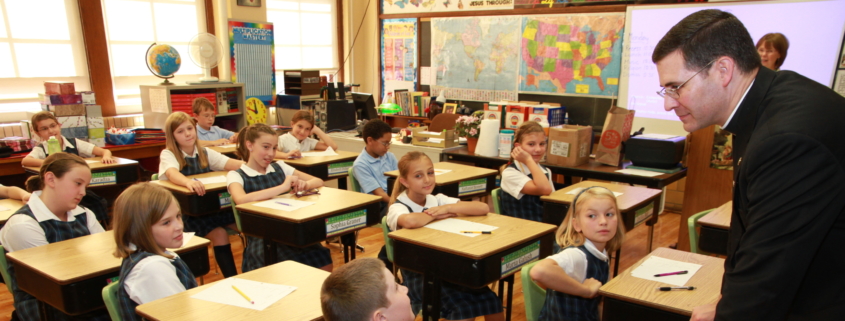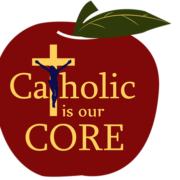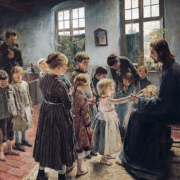Catholic Schools Need Catholic Standards
The Cardinal Newman Society presents our new Catholic Curriculum Standards to help Catholic educators strengthen their core mission of evangelization and forming young people for God.
The Newman Society has long promoted and defended faithful Catholic education, and increasingly this work is turned toward helping schools study, embrace and implement the Church’s vision for Catholic education. Our new Standards are central to this work.
“We want to help, to propose a path forward that is more appropriate for Catholic schools than the problematic Common Core and other secular options,” says Dr. Dan Guernsey, director of K-12 education programs for The Cardinal Newman Society and co-author of the Catholic Curriculum Standards with deputy director Dr. Denise Donohue.
“The Standards point Catholic education in the right direction,” Dr. Donohue says. “We expect and in fact encourage more innovation, continued efforts to delve into the mission of Catholic schools and further develop authentic Catholic standards of education so that Catholic identity thrives.”
With emphasis on literature, science, history and math, the Catholic Curriculum Standards incorporate Catholic insights into these curricular areas and indicate what students should be learning beyond the accumulation of useful skills and knowledge. The standards are grouped into two grade levels, K-6 and 7-12, to help educators assign or develop materials and choose subject matter that serve the unique mission of Catholic education.
For too long, many Catholic schools have relied heavily on secular government standards like the Common Core to measure school success and on similarly focused standardized tests to measure student outcomes. These distract Catholic educators from their core mission, because they ignore key aspects of human formation and often depend on philosophies of education that are contrary to the Catholic faith. Still, Catholic schools have far outperformed public schools because of the genuine concern of their leaders and teachers for students’ personal formation.
Good intentions, sadly, are not enough.
Catholic education’s road to renewal will be paved with genuine Catholic standards, resting on the solid foundation of Catholic teaching and the Church’s vision for Catholic education.
What are standards? Consider the grand promises of the Common Core State Standards: “These learning goals outline what a student should know and be able to do at the end of each grade. The standards were created to ensure that all students graduate from high school with the skills and knowledge necessary to succeed in college, career, and life, regardless of where they live.”
Standards indicate levels of student achievement. They help determine curriculum, testing, and measures of school success. When developed rightly, they are a wonderful tool for educators and have become fundamental to American schooling.
But if standards are fundamental to modern education, then it should be obvious that Catholic schools need Catholic standards. If we measure Catholic school success by standards that do not serve the authentic mission of Catholic education, we fail to attend to Catholic identity — and eventually, our schools simply fail.
But that doesn’t have to be the fate of Catholic education. It cannot be the fate of Catholic education, on which we rely for the reform of Catholic life and American society.
“Even amid growing challenges in today’s society, Catholic schools and homeschool programs that embrace and celebrate the mission of Catholic education continue to thrive across the United States,” write Drs. Donohue and Guernsey in their online letter introducing the Catholic Curriculum Standards. “The Cardinal Newman Society makes this free resource available to all educators, including parents, the primary educators of children, in hopes of continuing this renewal of Catholic education for the benefit of our children, our Church, and the common good they serve.”

 St. Agnes School, St. Paul, MN
St. Agnes School, St. Paul, MN



